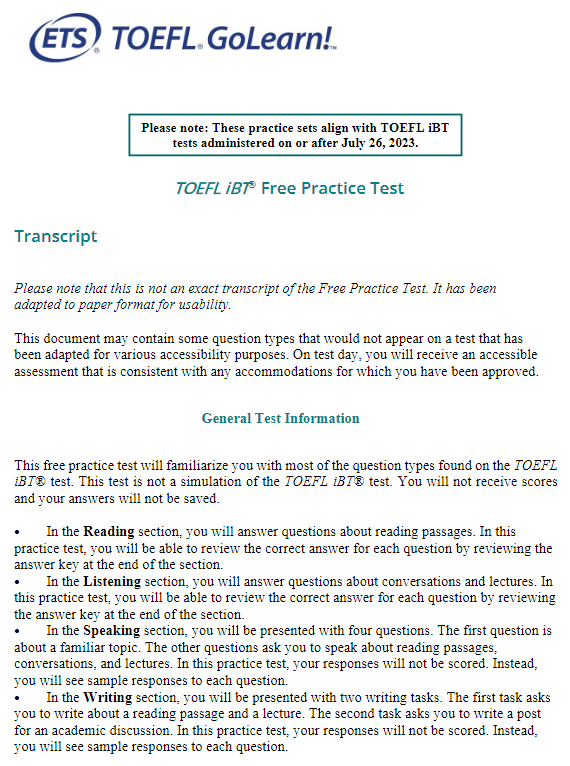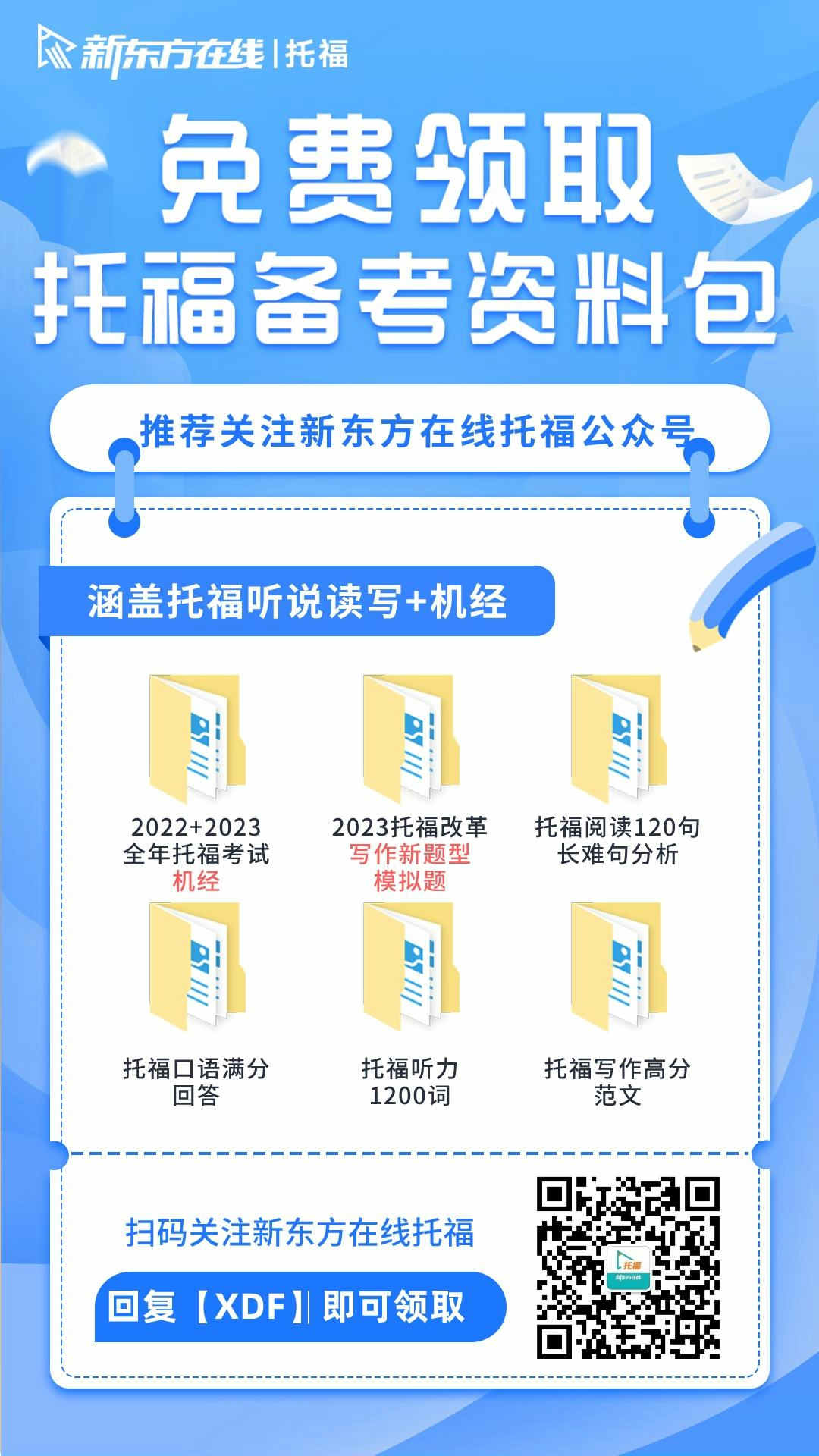托福分数测试HOT
托福课程优惠HOT
托福正价课试听0元
新托福机考练习NEW
0元讲座HOT
新版托福入门课程HOT
托福入门导学NEW
4000人报
托福机经
PDF版
TPO练习
官方授权
资料下载
826套
专业测评
40118人已测
高分经验
1193帖

扫码免费领资料
托福全科备考资料
免费水平测试及规划

扫码关注掌握一手留学资讯
回复XDF免费水平测试
新东方在线托福整理了托福备考书籍推荐(托福OG|托福绿宝书|托福官方指南等)、托福备考资料等,今天带来的是ETS官方TOEFL模考练习测试,希望大家能从书籍和资料中有所收获,在托福考试中取得好成绩!
参加全部四个部分的完整练习测试,并回答实际的过去测试问题。您可以尽量进行模拟考试!
查看 Reading 和 Listening 部分的正确答案。
聆听 Speaking 部分的示范答案。
阅读 Writing 部分的示范答案。
包括学术讨论任务的新写作
完整版托福模拟测试题,同学们可以扫码添加Una助教,即可免费领取!

>

Examining the Problem of Bycatch
1. A topic of increasing relevance to the conservation of marine life is bycatch—fish and other animals that are unintentionally caught in the process of fishing for a targeted population of fish. Bycatch is a common occurrence in longline fishing, which utilizes a long heavy fishing line with baited hooks placed at intervals, and in trawling, which utilizes a fishing net (trawl) that is dragged along the ocean floor or through the mid-ocean waters. Few fisheries employ gear that can catch one species to the exclusion of all others. Dolphins, whales, and turtles are frequently captured in nets set for tunas and billfishes, and seabirds and turtles are caught in longline sets. Because bycatch often goes unreported, it is difficult to accurately estimate its extent. Available data indicate that discarded biomass (organic matter from living things) amounts to 25–30 percent of official catch, or about 30 million metric tons.
2. The bycatch problem is particularly acute when trawl nets with small mesh sizes (smaller- than-average holes in the net material) are dragged along the bottom of the ocean in pursuit of groundfish or shrimp. Because of the small mesh size of the shrimp trawl nets, most of the fishes captured are either juveniles (young), smaller than legal size limits, or undesirable small species. Even larger mesh sizes do not prevent bycatch because once the net begins to fill with fish or shrimp, small individuals caught subsequently are trapped without ever encountering the mesh. In any case, these incidental captures are unmarketable and are usually shoveled back over the side of the vessel dead or dying.
3. The bycatch problem is complicated economically and ecologically. Bycatch is a liability to shrimp fishers, clogging the nets and increasing fuel costs because of increased drag (resistance) on the vessel. Sorting the catch requires time, leading to spoilage of harvested shrimp and reduced time for fishing. Ecologically, high mortality rates among juvenile fishes could contribute to population declines of recreational and commercial species. Evidence to this effect exists for Gulf of Mexico red snapper and Atlantic Coast weakfish. Because the near-shore areas where shrimp concentrate are also important nursery grounds for many fish species, shrimp trawling could have a profound impact on stock size.
4. Once the dead or dying bycatch is returned to the ecosystem, it is consumed by predators, detritivores (organisms that eat dead plant and animal matter), and decomposers (organisms that break down dead or decaying organic matter), which could have a positive effect on sport fish, seabird, crab, and even shrimp populations. Available evidence indicates that 40– 60 percent of the 30 metric tons of catch discarded annually by commercial fishing vessels, and even more of the noncatch waste (organisms killed but never brought to the surface), does not lie unused on the bottom of the sea. It becomes available to midwater and ocean- bottom scavengers, transferring material into their food web and making energy available to foragers (organisms that search for food) that is normally tied up in ocean-bottom, deep- ocean, midwater, and open-ocean species
5. Overfishing and overdiscarding may thus contribute to a syndrome known as “fishing down of food webs,” whereby we eliminate apex (top) predators and large species while transforming the ocean into a simplified system increasingly dominated by microbes, jellyfish, ocean-bottom invertebrates, plankton, and planktivores. The strongest evidence for the fishing down phenomenon exists in global catch statistics that show alarming shifts in species composition from high-value, near-bottom species to lower-value, open-ocean species. In the last three decades of the twentieth century, the global fishing fleet doubled in size and technology advanced immeasurably. Despite increased effort and technology, total catch stabilized, but landing rates (rates at which species are caught) of the most valuable species fell by 25 percent.
6. Conservation organizations have condemned the obvious and extreme waste associated with bycatch. Public concern over high mortality rates of endangered marine turtles captured in shrimp trawls led to the development of turtle exclusion devices (TEDs) in the 1980s. TEDs were incorporated into the shrimp net design with the purpose of directing turtles out of nets without unacceptably reducing shrimp catches. Marine engineers and fishers also developed shrimp net designs that incorporate bycatch reduction devices (BRDs), taking advantage of behavioral differences between shrimp and fish, or between different fishes, in order to separate fishes.
Directions: Now answer the questions.
1. Why does the author provide the information that “Available data indicate that discarded biomass (organic matter from living things) amounts to 25–30 percent of official catch, or about 30 million metric tons”?
(A) To disprove the claim that it is difficult to accurately estimate the extent of the bycatch problem
(B) To illustrate the extreme effectiveness of the longline and trawling methods
(C) To suggest that uncertainty about the true extent of bycatch does not leave in doubt that it is a problem
(D) To indicate that data about bycatch are available only from fisheries having the right kind of gear
2. According to paragraph 1, which of the following is true about the impact of various methods of fishing on the problem of bycatch?
(A) Almost all commercial fishing methods capture fish and animals that the fishers do not want.
(B) Switching from trawling to longline fishing would save seabirds and turtles from being unintentionally caught.
(C) Longline fishing is particularly dangerous for dolphins and whales.
(D) Trawling on the ocean floor produces less bycatch than does trawling through mid-ocean waters.
3. The word “acute” in the passage is closest in meaning to
(A) common
(B) severe
(C) complicated
(D) noticeable
4. According to paragraph 2, why have larger mesh sizes not provided a practical solution to bycatch in shrimp fishing?
(A) Larger openings increase the risk that nets will get tangled or damaged as they are being hauled over the sides of the vessel.
(B) Openings large enough to prevent the capture of juvenile and other undesirable fish would also release the shrimp.
(C) Large mesh sizes are more likely to result in fish getting stuck partway through,causing more deaths within the catch.
(D) When nets grow full, they still trap fish that cannot reach the mesh openings.
5. According to paragraph 3, which of the following is NOT a problem associated with bycatch
in shrimp fishing?
(A) Shrimp fishers have to buy more fuel because of the added weight of the extra fish in their nets.
(B) The population of recreational and commercial species declines because much of the bycatch is their prey, resulting in a food shortage for them.
(C) Shrimp fishers must spend time sorting the shrimp from the bycatch, and some shrimp spoil during this time.
(D) The populations of some species of fish are reduced because so many of their young are caught in shrimp nets.
6. According to paragraph 4, how does bycatch sometimes benefit sport fish, seabird, crab, and even shrimp populations?
(A) The discarded fish provide these species with a significant amount of food that would otherwise be unavailable to them.
(B) Fishing eliminates up to 40 to 60 percent of the predators of these species, most of which are caught unintentionally.
(C) These fish and other animals may be caught unintentionally in overcrowded locations and then released into more favorable environments.
(D) Many of the competitors of these species are eliminated by fishing, leaving them with access to more food and other resources.
7. Which of the sentences below best expresses the essential information in the highlighted sentence in paragraph 5? Incorrect choices change the meaning in important ways or leave out essential information.
(A) Overfishing and overdiscarding of jellyfish, ocean-bottom invertebrates, plankton,and planktivores are transforming the ocean in a process known as fishing down of food webs.
(B) Overdiscarding bycatch simplifies the food web by favoring the kinds of predators that feed on such prey as jellyfish, ocean-bottom invertebrates, and planktivores.
(C) Fishing down of food webs may occur if overfishing and bycatch disposal result in the disappearance of species at the top of the food web and the dominance of species near the bottom.
(D) Overfishing and overdiscarding is a syndrome that affects not only top predators and large species but also microbes, jellyfish, ocean-bottom invertebrates, plankton, and planktivores.
8. What does paragraph 5 suggest is the reason why landing rates of the most valuable species fell 25 percent in the last three decades of the twentieth century?
(A) Changes in technology led many fishers to shift from a focus on near-bottom species to lower-value open-ocean species.
(B) Around the world, the number of people and ships involved in the fishing trade declined because of changes in the demand for fish.
(C) The total amount of fish in the ocean decreased significantly, leading to a steady decrease in global total catch.
(D) The most valuable species make up a much smaller percentage of the total sea population than they used to.
9. In the paragraph below, there is a missing sentence. Look at the paragraph and indicate (A,B, C and D) where the following sentence could be added to the passage.
Turtles were not the only marine species to benefit from new catch techniques.
Where would the sentence best fit?
Conservation organizations have condemned the obvious and extreme waste associated with bycatch. (A) Public concern over high mortality rates of endangered marine turtles captured in shrimp trawls led to the development of turtle exclusion devices (TEDs) in the 1980s. (B)TEDs were incorporated into the shrimp net design with the purpose of directing turtles out of nets without unacceptably reducing shrimp catches. (C) Marine engineers and fishers also developed shrimp net designs that incorporate bycatch reduction devices (BRDs),taking advantage of behavioral differences between shrimp and fish, or between different fishes, in order to separate fishes. (D)
A. Option A
B. Option B
C. Option C
D. Option D
10.Directions: An introductory sentence for a brief summary of the passage is provided below.Complete the summary by selecting the 3 answer choices that express the most important ideas in the passage. Some sentences do not belong in the summary because they express ideas that are not presented in the passage or are minor ideas in the passage. This question is worth 2 points.
Write your answer choices in the spaces where they belong. You can either write the letter of your answer choice or you can copy the sentence.
Many fish and other animals are unintentionally caught during commercial fishing, a problem known as bycatch.
·
·
·
Answer choices
(A) Bycatch occurs in both longline fishing and trawling and affects a range of species,although marine engineers have developed net devices that have lessened the problem for some species.
(B) Female fish are especially likely to become bycatch when they are near the ocean bottom spawning their eggs, which decreases the populations of commercially desirable fish such as salmon and tuna.
(C) Trawling with small mesh nets for shrimp results in large amounts of bycatch,especially of small, young, or unwanted species of fish, causing a range of problems for shrimp fishers and the ecosystem.
(D) Efforts are being made to come up with productive uses for bycatch, such as providing food for fish farms or being used in agricultural products such as animal feed and fertilizers.
(E) When bycatch is disposed of in the ocean, the extra food is eaten by predators,detrivores, and decomposers but may ultimately cause the most valuable species to decline.
(F) Much of the equipment designed to prevent bycatch has so far proven to be largely ineffective, with TEDs failing to significantly reduce the number of sea turtles captured in fishing nets.
Directions: Now answer the questions.
1. Why does the man go to see the professor?
A. To hand in a late assignment
B. To find out about jobs in the department
C. To discuss Dean Adams’ current research
D. To volunteer to help organize an event
2. How did the man learn about Dean Adams’ retirement?
A. He read about it in an e-mail message.
B. It was posted on a bulletin board.
C. He heard other students discussing it.
D. Dean Adams announced it in her class.
3. Why does the professor refuse the man’s offer to help with a party? [Choose 2 answers.]
A. Two people are already working on it.
B. She prefers that he spend his time on another project.
C. The party does not require much preparation.
D. Dean Adams is not permanently leaving the department
4. Why does the professor talk about speciation?
A. To describe the main focus of the work she needs help with
B. To tell the man about a new research area in ethnology
C. To explain what Dean Adams chose to work on in Indonesia
D. To demonstrate how varied Dean Adams’ research has been
5. Part of the conversation is repeated below. Read it and answer the question.
Narrator Listen again to part of the conversation. Then answer the question.
Female Professor There’s not much glory in it, but we’re looking for someone with some knowledge of anthropology who can enter the articles…I hesitate to mention it,but I don’t suppose this is something you would...
Why does the professor say this:
Female Professor I hesitate to mention it, but I don’t suppose this is something you would...
A. To express doubt about the man’s qualifications for the project
B. To ask the man if he would be willing to work on the project
C. To ask the man to recommend someone for the project
D. To apologize for not being able to offer the project to the man
Online or Classroom
State whether you agree or disagree with the following statement. Then explain your reasons, using specific details in your explanation.
Learning through online courses is more effective than learning in the traditional classroom setting.
If this were an actual test question, you would have 15 seconds to prepare and 45 seconds to speak.
Preparation Time: 15 seconds
Response Time: 45 seconds
In this practice test, you may use a timer to practice preparing and giving a response. If you can, record your answer and compare it to the sample response.
our professor is teaching a class on sociology. Write a post responding to the professor’s question.
In your response you should:
• express and support your opinion
• make a contribution to the discussion
An effective response will contain at least 100 words.
Dr. Diaz
Over the next few weeks, we are going to look at lots of different materials about the role of television programs and television watching in people’s lives. But first, I want to know what you think about this topic. So here’s a question for the class discussion board:
What do you think is the most significant effect that watching television has on people? Why do you think television has this effect?
Kelly
I know that one way that television influences people’s behavior is that when you are watching television, you are not moving around or exercising. This is especially true for children. The American Academy of Pediatrics says that when children spend a lot of time watching television, they have a greater tendency to be overweight.
Paul
I think the main effect that television has on people is to broaden their experience. There are so many programs devoted to nature and travel. Think of all the different places in the world you can experience through television! Last night I watched a program about life in Antarctica, and it was fascinating!
新东方在线托福还为大家整理了托福备考资料、托福机经,同学们可以扫描下方二维码,关注新东方在线托福,回复【XDF】,即可获得托福资料包!

你是否还想知道:

 资料下载
资料下载
2021-2025托福机经试题|答案|范文下载
发布时间:2024-02-21关注新东方在线托福
回复【XDF】获取
托福全科备考资料大礼包
发布时间:2024-02-21关注新东方在线托福
回复【XDF】获取
托福正价课试听课程包
发布时间:2024-02-21关注新东方在线托福
回复【XDF】获取
托福定制备考规划
发布时间:2024-02-21关注新东方在线托福
回复【XDF】获取
托福TPO免费模考
发布时间:2024-02-21关注新东方在线托福
回复【XDF】获取
托福免费水平测试
发布时间:2024-02-21关注新东方在线托福
回复【XDF】获取
托福写作新题型模拟题+范文汇总[ETS发布]
发布时间:2023-07-30关注新东方在线托福
回复【XDF】获取
2023全年托福机经PDF版下载
发布时间:2023-06-17关注新东方在线托福
回复【XDF】获取
2022全年托福机经PDF版下载
发布时间:2023-06-17关注新东方在线托福
回复【XDF】获取
2022全年写作托福机经整理
发布时间:2023-01-13关注新东方在线托福
回复【XDF】获取
2022年托福考后题目回忆
发布时间:2023-01-13关注新东方在线托福
回复【XDF】获取
托福口语黄金80题附录音
发布时间:2023-01-13关注新东方在线托福
回复【XDF】获取
新东方IBT写作网络课堂录音[.rar]
发布时间:2023-01-13关注新东方在线托福
回复【XDF】获取
21天托福听力提升计划
发布时间:2023-01-13关注新东方在线托福
回复【XDF】获取
不怕跑题偏题,这份写作资料请收好
发布时间:2023-01-13关注新东方在线托福
回复【XDF】获取
托福阅读提分技巧锦囊妙计
发布时间:2023-01-13关注新东方在线托福
回复【XDF】获取
口语拖后腿?因为你缺少这套万能句式资料
发布时间:2019-11-01关注新东方在线托福
回复【XDF】获取
攻破托福听力难关的资料包
发布时间:2023-01-13关注新东方在线托福
回复【XDF】获取
看剧学英语,经典美剧一键获取
发布时间:2019-11-01关注新东方在线托福
回复【XDF】获取
原版外刊资源合集|精心打包整理
发布时间:2019-11-01关注新东方在线托福
回复【XDF】获取

关注新东方在线托福,
回复【XDF】获取大礼包

 推荐阅读
推荐阅读
很多考生会选择一些托福刷题网站,希望通过大量的练习来提高自己的水平和信心。但是,仅仅刷题是不够的,如果没有正确的方法和策略,刷题也会变成一种低效的学习方式,甚至会造成时间和精力的浪费。
为了提高托福成绩,很多考生会选择在网上刷题,以提升自己的英语水平和熟悉考试题型。但是,面对众多的托福刷题网站,你应该如何选择最适合你的呢?在这篇文章中,我将为你介绍优质的托福刷题网站:新东方托福刷题网站,并分析它们的特点和优势,帮助你找到最适合你的托福刷题平台。
要想在托福考试中取得好成绩,不仅需要掌握扎实的英语基础,还需要熟悉托福考试的规则和策略,以及进行大量的模拟练习。那么,如何选择最适合你的托福刷题网站呢?在这里,我将为你介绍几个优质的托福刷题网站,以及它们的特点和优势,帮助你找到最适合你的托福备考平台。
托福考试网整理了托福考前模拟题、托福备考书籍推荐、托福备考资料等,今天带来的是2024年1月托福阅读|口语|写作考前必刷题,希望大家能从书籍和资料中有所收获,在托福考试中取得好成绩!
新东方在线托福整理了托福备考书籍推荐(托福OG|托福绿宝书|托福官方指南等)、托福备考资料等,今天带来的是托福阅读TPO词汇题汇总,希望大家能从书籍和资料中有所收获,在托福考试中取得好成绩!



 资料下载
资料下载
关注新东方在线托福
回复【XDF】获取
关注新东方在线托福
回复【XDF】获取
关注新东方在线托福
回复【XDF】获取
关注新东方在线托福
回复【XDF】获取
关注新东方在线托福
回复【XDF】获取
关注新东方在线托福
回复【XDF】获取
关注新东方在线托福
回复【XDF】获取
关注新东方在线托福
回复【XDF】获取
关注新东方在线托福
回复【XDF】获取
关注新东方在线托福
回复【XDF】获取
关注新东方在线托福
回复【XDF】获取
关注新东方在线托福
回复【XDF】获取
关注新东方在线托福
回复【XDF】获取
关注新东方在线托福
回复【XDF】获取
关注新东方在线托福
回复【XDF】获取
关注新东方在线托福
回复【XDF】获取
关注新东方在线托福
回复【XDF】获取
关注新东方在线托福
回复【XDF】获取
关注新东方在线托福
回复【XDF】获取
关注新东方在线托福
回复【XDF】获取

 阅读排行榜
阅读排行榜
 相关内容
相关内容